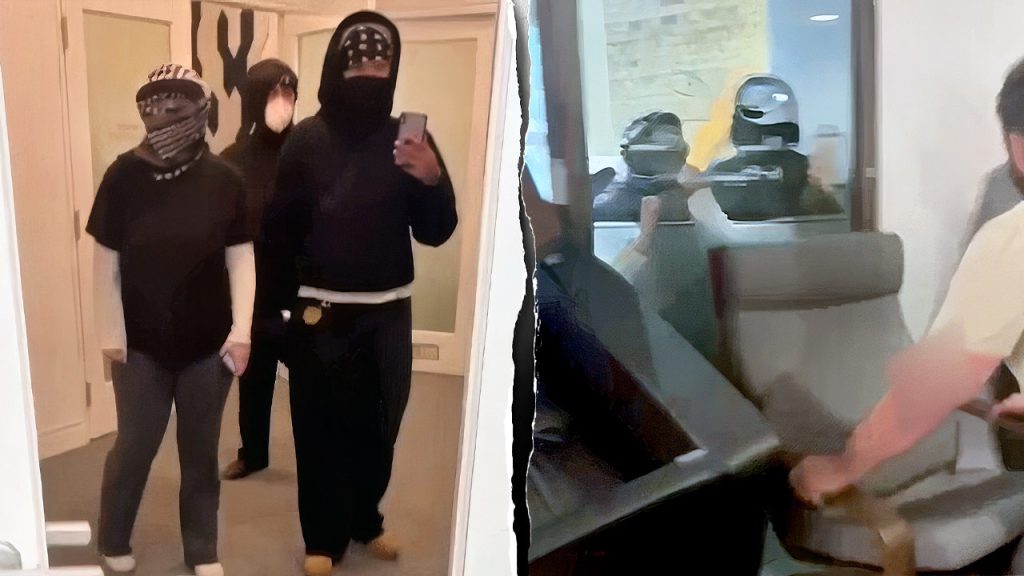Pro-Israel Event in Toronto Turns Violent Amid Rising Tensions
In a troubling escalation of tensions in Toronto, what was meant to be a peaceful discussion featuring Israeli military veterans descended into chaos and violence. The event, organized by Students Supporting Israel at Toronto Metropolitan University, faced a coordinated disruption that left participants barricaded behind furniture and one speaker injured. This incident has sparked renewed concerns about the safety of Jewish and pro-Israel voices in public spaces, particularly as rhetoric around the Israel-Gaza conflict intensifies in major Western cities.
Jonathan Karten, an Israeli-American speaker who had traveled to Toronto to share the personal story of his uncle—an Israeli soldier kidnapped and murdered by Hamas in 1996—instead found himself in the midst of a frightening confrontation. “As soon as we got there, we were attacked by roughly forty protesters,” Karten recounted, still processing the events. The attackers, some wearing masks, managed to breach the venue despite last-minute location changes made specifically for safety concerns. What particularly disturbed Karten was the apparent foreknowledge the protesters had: “They were waiting for us before we even started speaking,” he observed, adding that such an organized assault was something he “never assumed would happen in a civilian population in a Western country.” The violence left Karten injured when attackers broke through a glass door, forcing attendees to create makeshift barricades using tables and chairs until police arrived.
The timing of this attack carries particular significance, coming just days after controversial remarks from Toronto’s Mayor Olivia Chow, who referred to “the genocide in Gaza” during a public event. Her characterization drew immediate condemnation from Jewish community leaders, including Michael Levitt of the Friends of Simon Wiesenthal Center, who called it “shocking and dangerous language” that could “validate hate and normalize the harassment of Jews.” The mayor’s comments, followed so quickly by physical violence at a Jewish event, have raised questions about whether inflammatory rhetoric from public officials might be contributing to an atmosphere where extremists feel emboldened to take direct action against Jewish and pro-Israel gatherings.
Despite the traumatic experience, Karten expressed a resolute determination to continue speaking on campuses about his experiences and perspectives. “We’re cautious, but not scared,” he said, emphasizing the importance of ensuring “Jewish and Israeli voices are heard without fear.” His steadfastness reflects a broader sentiment among many in the Jewish community who feel increasingly targeted yet remain committed to maintaining their public presence and voice. The attack has prompted serious soul-searching among event organizers about how to balance open dialogue with necessary security measures in an environment where even private gatherings can become targets for politically-motivated violence.
Toronto police have confirmed that five individuals were arrested in connection with the attack, all of whom are scheduled to appear in court in January. According to their official statement, the protesters entered the private event without permission, damaged property, and created conditions where attendees genuinely feared for their safety. While one person sustained injuries from broken glass during the confrontation, a police spokesperson offered one positive note amid the concerning incident: antisemitic incidents, while still representing the most frequently reported hate-motivated category in Toronto, have actually declined by 41% compared to the previous year’s statistics.
This incident in Toronto is not occurring in isolation but reflects broader tensions playing out across university campuses and cities throughout North America and Europe. From London to New York, pro-Israel events have faced increasing disruption, while Jewish students on many campuses report feeling unsafe expressing their identities or views. The Toronto attack represents a worrying escalation from protest to physical violence and property destruction, raising serious questions about the boundaries between legitimate political expression and intimidation. As universities and cities grapple with how to protect free speech while ensuring physical safety, incidents like this serve as sobering reminders of how quickly political polarization can transform into direct confrontation, particularly when inflammatory rhetoric goes unchallenged in the public sphere.


